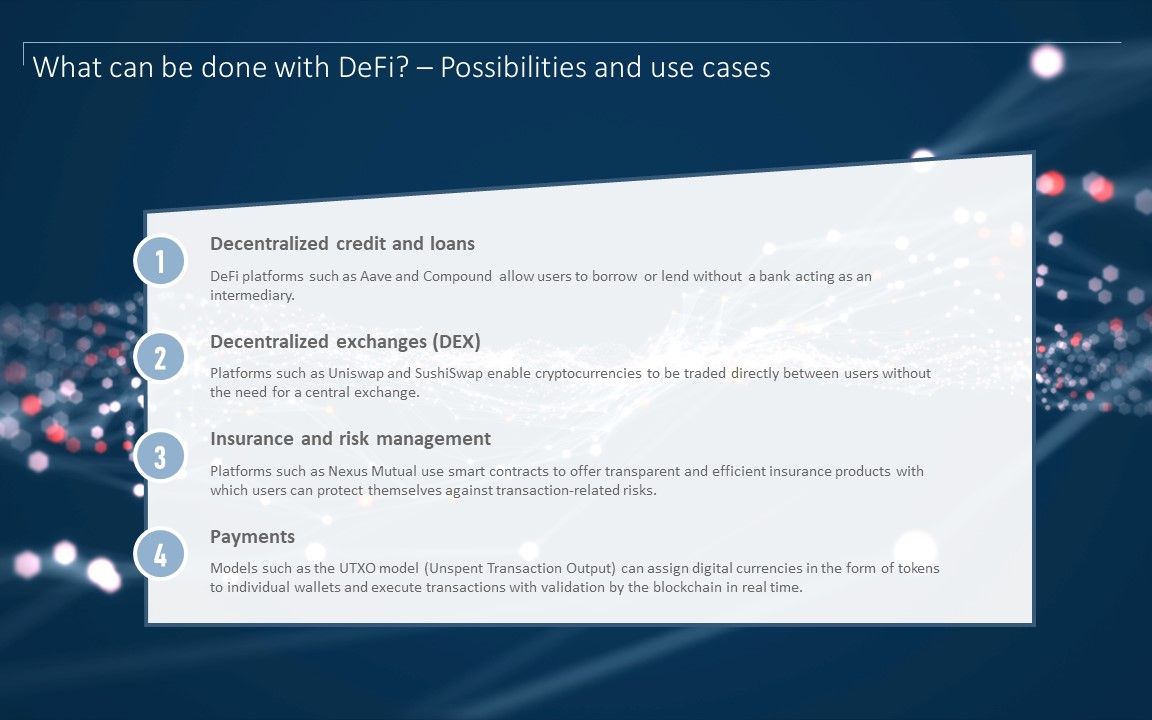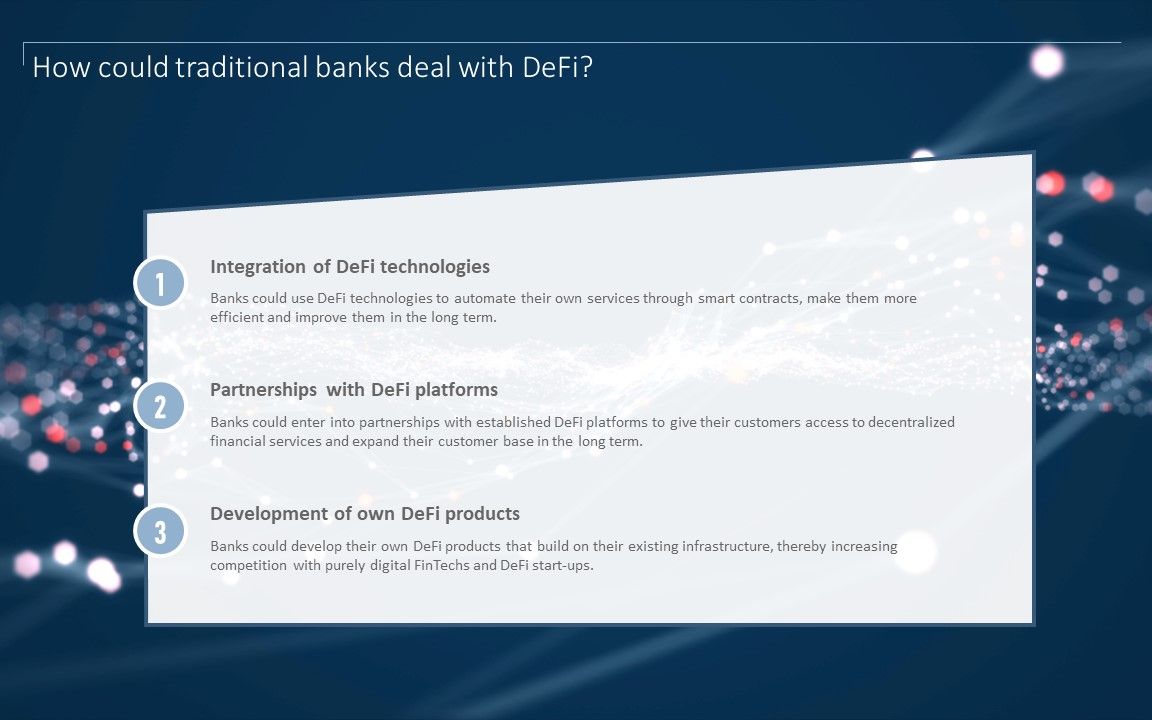DeFi – The future of the financial industry?

#DecentralizedFinance #Innovation #Blockchain #FinTech
Decentralized financial systems are a new, modern and perhaps even pioneering form of financial markets. New technologies such as blockchain allow unprecedented freedom in the validation or storage of information. But what exactly is behind it and why is it so important for the financial industry? In this blog post, we explain the basics of DeFi in more detail, present some exciting use cases and highlight the potential benefits and challenges of this technology.
What is DeFi?
DeFi is the abbreviation for “Decentralized Finance” and refers to financial systems based on blockchain technology. In contrast to traditional financial systems, which are operated by central institutions such as banks and stock exchanges, DeFi platforms are operated in a decentralized manner. This means that no additional intermediaries are needed and everything is controlled via the blockchain or smart contracts on the blockchain (depending on the type of blockchain). DeFi thus creates a democratic and direct financial market that does not require gatekeepers or financial intermediaries.
What can be done with DeFi? – Possibilities and use cases
- Decentralized credit and loans: DeFi platforms such as Aave and Compound enable users to take out or grant loans without a bank acting as an intermediary. This is done directly via a smart contract that automatically sets and enforces the terms of the loan. The advantages are faster processing, lower costs and a wider range of credit options. For example, users can deposit their cryptocurrency as collateral and immediately take out a loan in another cryptocurrency.
- Decentralized exchanges (DEX): Platforms such as Uniswap and SushiSwap enable cryptocurrencies to be traded directly between users without the need for a central exchange. This increases security and reduces trading costs as no fees have to be paid to intermediaries. As users process the transactions directly from their own wallet, the responsibility naturally lies with the user themselves, which could deter some users, but is more appealing to others due to the personal responsibility.
- Insurance and risk management: DeFi also offers new opportunities in the insurance sector. Platforms such as Nexus Mutual use smart contracts to offer transparent and efficient insurance products. Users can insure themselves against certain transaction-related risks such as the failure of smart contracts and receive an automatic payout in the event of a claim. This can make a big difference, especially in (developing) countries where traditional insurance is difficult to access.
- Payments: Payment transactions can also be simplified and made more efficient through the use of DeFi. For digital currencies, for example, an Unspent Transaction Output (UTXO) model can be used, which can assign tokenized money to individual wallets and execute transactions with validation by the blockchain in real time. One of the biggest differences to conventional systems is the characterization of a payment. When a payment is released by the debtor, ownership of the token is immediately transferred to the creditor instead of a short-term liability being incurred. In our blog post “Transaction models for digital currencies“, we looked at the comparison with traditional systems as well as the advantages and disadvantages.

What are the advantages of DeFi?
- Transparency: All transactions are publicly visible on the blockchain, which makes fraud and corruption more difficult. Every transaction is stored in an immutable ledger that can be viewed by anyone. This applies as long as the blockchain is a public chain – in a private chain, a closed system, public access is similarly restricted as in today’s systems.
- Efficiency: The elimination of intermediaries speeds up processes and reduces costs. Smart contracts automate many processes that would normally have to be carried out manually or by third parties.
- Accessibility: DeFi enables people around the world to participate in financial activities, regardless of their location or access to traditional financial services. This is particularly important in regions where the traditional banking system is not well developed. All you need is an internet-enabled cell phone and you’re ready to go!
What are the challenges of DeFi?
- Security: DeFi platforms are still vulnerable to cyberattacks and technical errors. Security gaps in smart contracts can lead to high losses.
- Regulation: The legal framework for DeFi is still unclear in many countries. Regulators need to find ways to ensure user protection without stifling innovation. There is also a lot of ignorance among regulators worldwide about this rapidly developing market. In the worst case scenario, this can lead to regulators, particularly banks, denying certain DeFi products or even all access to DeFi. With regard to our European location, this would be fatal – it remains to be hoped that regulators will continue to build up knowledge about DeFi and find a common path with the banks.
- Volatility: Cryptocurrencies, which are often used as collateral, are volatile and can lead to high losses. This poses a risk for users who take out loans or use other financial services. Particularly in the area of lending, current products work de facto exclusively with pure over-collateralization. Up to 200% of the loan amount often has to be deposited as collateral, as a traditional credit check, as we are used to today, does not take place. It can be assumed that market participants will also develop solutions for this, especially if activities in the web3 and crypto environment increase. However, loans and lending protocols are currently still reliant on overcollateralization.
What does this mean for traditional banks (TradFi)?
DeFi poses major challenges for traditional banks, but also offers numerous opportunities. Banks need to ask themselves how they can position themselves in an increasingly decentralized financial world. In our view, the following approaches are particularly suitable for this:
- Integration of DeFi technologies: Banks could use DeFi technologies to improve their own services. For example, they could use smart contracts to automate loan agreements and thus increase efficiency in loan processing or lending and reduce costs. This applies in particular to recurring payment flows, interest payments and installment payments. Thinking further, the automation of dividends or corporate actions would also be a major efficiency lever.
- Partnerships with DeFi platforms: Banks could partner with established DeFi platforms to provide their customers with access to decentralized financial services. This could expand the customer base and open up additional revenue streams. This approach is particularly promising in the blockchain environment. From a banking perspective, it is generally simply not worthwhile to build up the necessary knowledge internally from scratch. There are already many reliable and really good partners here, especially in Europe and also here in Germany!
- Development of own DeFi products: Banks could develop their own DeFi products that build on their existing infrastructure. This could help them to compete with purely digital FinTechs and DeFi start-ups.

What lies ahead for DeFi?
The future of DeFi is promising, but there are still many challenges to overcome. Regulatory issues need to be clarified, security gaps closed and public acceptance promoted. Traditional financial institutions could benefit from the integration of DeFi technologies by expanding and modernizing their services. Young generations such as Z or Alpha are increasingly looking for investment opportunities, investment products and modern, simple ways to manage their money. The traditional way often doesn’t stand a chance here. DeFi will play a key role here.
Conclusion – The great potential of DeFi
DeFi has the potential to fundamentally change the world of finance. It offers new opportunities for lending, trading, insurance and payments, but also brings challenges. Banks should keep a close eye on developments in this area and consider how they can integrate DeFi technologies into their own business models. Follow developments in this exciting area and consider how your business can benefit from these innovations.
Do you have specific questions about Decentralized Finance and the resulting use cases?
Our experts at Horn & Company are available to discuss the implications of DeFi for your business model. We invite you to share your thoughts and experiences on this topic with us. Let’s shape the future of the financial industry together!

Contact the author
Philipp Misura
E-Mail: philipp.misura@horn-company.de

Contact the author
Leon Heyn
E-Mail: leon.heyn@horn-company.de
Your gateway to industry knowledge and expert analysis! Follow us on LinkedIn for exclusive professional articles and project insights.
